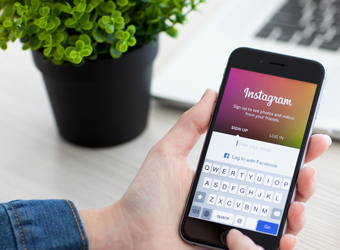Instagram is the most damaging social media platform when it comes to the youth’s mental health, new research suggests.
The photo-sharing app, which is owned by Facebook and has 700 million users worldwide, is considered the social media platform most likely to cause young people to feel depressed, anxious and lonely, according to a U.K.-wide study by the Royal Society for Public Health (RSPH) released Friday.
In a survey of almost 1,500 Britons aged 14 to 24, the RSPH found that young people were most likely to associate Instagram with negative attributes and low self-esteem, resulting in poor body image and lack of sleep.
Snapchat, the ephemeral photo messaging app, was also seen as a close contender, and most likely to leave users feeling bullied or left out by their peers.
“It’s interesting to see Instagram and Snapchat ranking as the worst for mental health and wellbeing – both platforms are very image-focused and it appears they may be driving feelings of inadequacy and anxiety in young people,” said Shirley Cramer, chief executive of RSPH, who conducted the #StatusOfMind report in collaboration with the Young Health Movement (YHM).
Net negative impact
- Snapchat
- YouTube
Instagram said that it remains dedicated to keeping the platform a “safe and supportive place” for users, and added that it is working closely with experts to enhance the app to provide mental health support.
“Keeping Instagram a safe and supportive place, where people feel comfortable expressing themselves, is our top priority – particularly when it comes to young people,” said Michelle Napchan, Instagram head of policy, EMEA.
“That’s why we work in partnership with experts to give people the tools and information they need while using the app, including how to report content, get support for a friend they are worried about or directly contact an expert to ask for advice on an issue they may be struggling with.”
The app otherwise scored well for enabling self-expression and self-identity when assessed against 14 statements relating to health and well-being.
Meanwhile, Google-owned YouTube was considered the most likely to promote positive attributes, such as developing awareness, enabling self-expression and proving young people with emotional support. However, it was considered the most detrimental to young people’s sleeping patterns.
Facebook and Twitter both emerged divisive in their impact on young people’s mental well-being. Both platforms were considered positive for self-expression and community building, though they were both also seen to lead to bullying and depression.
Social media companies must do more
With social media’s global presence showing little signs of abating, the RSPH has called on companies to do more to tackle its adverse effects of young people and has issued a series of recommendations.
These include introducing a pop-up warning to notify young people when they have been using the app for an extended period and disclosures indicating when a photo has been digitally enhanced.
“As the evidence grows that there may be potential harms from heavy use of social media, and as we upgrade the status of mental health within society, it is important that we have checks and balances in place to make social media less of a wild west when it comes to young people’s mental health and wellbeing,” said Cramer.
Becky Inkster, honorary research fellow at the University of Cambridge, added that medical bodies could also harness social media to help them communicate with young people about mental health issues.
“For young people, using social media and digital technologies as a tool to help with mental health make sense for many reasons,” she said.
“As health professionals we must make every attempt to understand modern youth culture expressions, lexicons, and terms to better connect with their thoughts and feelings.”
Source: CNBC


